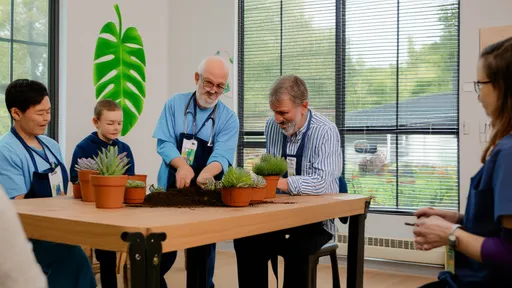The concept of cognitive reserve has revolutionized our understanding of brain health and longevity. Unlike the traditional view that treats cognitive decline as inevitable, emerging research suggests that the brain possesses a remarkable capacity to adapt and compensate for age-related changes. This adaptive potential, known as cognitive reserve, isn't just about preventing decline—it's about building resilience throughout one's lifetime.
At its core, cognitive reserve represents the brain's ability to improvise and find alternative ways of getting things done. Think of it as a mental safety net that allows some individuals to withstand more neurological damage before showing outward signs of impairment. What makes this particularly exciting is that cognitive reserve isn't fixed at birth; it can be cultivated through deliberate lifestyle choices and mental engagement.
The foundation of cognitive reserve begins in childhood, with enriched learning environments playing a crucial role. Children exposed to diverse cognitive stimuli develop more robust neural networks that serve them well in later years. However, the window of opportunity doesn't close after adolescence. The brain maintains its plasticity—the ability to reorganize itself by forming new neural connections—throughout adulthood and into old age.
Educational attainment stands out as one of the most significant contributors to cognitive reserve. Years spent in formal education create dense networks of interconnected neurons that provide alternative pathways for information processing. Yet formal education isn't the only path. Self-directed learning, whether through reading, taking courses, or exploring new skills, can produce similar benefits at any stage of life.
Occupational complexity represents another powerful reserve-building factor. Jobs that require problem-solving, negotiation, and the synthesis of complex information appear to strengthen the brain's adaptive capacities. This doesn't mean everyone needs a high-powered career—engagement in mentally stimulating hobbies or volunteer work can offer comparable advantages.
The social dimension of cognitive reserve often gets overlooked but may be equally vital. Maintaining rich social networks and participating in community activities provides cognitive stimulation while also offering emotional support. Social interactions require us to process subtle cues, anticipate others' responses, and adapt our behavior—all of which exercise important cognitive functions.
Physical health forms the bedrock upon which cognitive reserve builds. Regular exercise, particularly aerobic activity, enhances blood flow to the brain and stimulates the release of growth factors that support neuron health. Nutrition plays a complementary role, with Mediterranean-style diets rich in omega-3 fatty acids, antioxidants, and polyphenols showing particular promise for brain health.
Sleep quality emerges as another critical factor in the cognitive reserve equation. During sleep, the brain engages in essential maintenance activities, clearing metabolic waste and consolidating memories. Chronic sleep deprivation not only impairs cognitive function in the short term but may also accelerate neurodegenerative processes over time.
Novelty and challenge serve as the catalysts that transform routine activities into reserve-building opportunities. The brain thrives on new experiences that require it to adapt and reorganize. Learning a musical instrument in midlife, studying a foreign language in retirement, or even taking up painting in one's golden years can all contribute to cognitive reserve.
The bilingual advantage provides compelling evidence for cognitive reserve. Individuals who regularly use multiple languages demonstrate enhanced executive function and delayed onset of dementia symptoms. This suggests that the mental juggling act required to switch between languages exercises the brain in ways that build reserve capacity.
Stress management deserves special attention in any discussion of cognitive reserve. Chronic stress elevates cortisol levels, which can damage the hippocampus—a brain region crucial for memory. Mindfulness practices, relaxation techniques, and maintaining work-life balance all help mitigate these harmful effects while promoting neuroplasticity.
Building cognitive reserve isn't about pursuing any single intervention but rather cultivating a lifestyle that integrates multiple protective factors. The synergistic effect of mental, physical, and social engagement appears greater than the sum of its parts. This holistic approach helps explain why some individuals maintain sharp cognition despite significant brain pathology.
The time to start building cognitive reserve isn't when symptoms appear—it's now, regardless of age. The brain responds to positive inputs at every life stage, though earlier interventions may offer greater cumulative benefits. This isn't about preventing aging but about optimizing how we age cognitively.
Emerging technologies are opening new frontiers in cognitive reserve research. Advanced neuroimaging allows scientists to observe reserve-building processes in real time, while digital platforms provide unprecedented opportunities for cognitive engagement. These tools may soon enable personalized reserve-building strategies based on individual risk factors and preferences.
Public health initiatives increasingly recognize the importance of cognitive reserve. Community programs that promote lifelong learning, intergenerational activities, and brain-healthy lifestyles represent cost-effective approaches to maintaining cognitive vitality across populations. Such initiatives could significantly reduce the societal burden of age-related cognitive disorders.
The economic implications of cognitive reserve are profound. By delaying the onset of dementia symptoms even by a few years, individuals can maintain productivity and independence longer, reducing healthcare costs and preserving quality of life. Employers who foster mentally stimulating work environments may benefit from more resilient workforces.
Critically, the cognitive reserve framework empowers individuals to take an active role in their brain health destiny. Rather than viewing cognitive fate as predetermined by genetics, this perspective emphasizes the transformative potential of daily choices. Each mentally stimulating activity, social connection, and healthy habit contributes to a more resilient brain.
Future research will likely uncover additional reserve-building strategies and refine our understanding of how different factors interact. What remains clear is that cognitive reserve offers a hopeful message: through intentional living, we can shape our cognitive trajectories and face the aging process with greater confidence and capability.
The journey toward building cognitive reserve is highly personal, reflecting individual interests, circumstances, and values. There's no single prescribed path—only the universal principle that an engaged, varied, and healthy lifestyle provides the optimal conditions for cognitive resilience to flourish across the lifespan.

By /Jul 14, 2025

By /Jul 14, 2025

By /Jul 14, 2025

By /Jul 14, 2025

By /Jul 14, 2025

By /Jul 14, 2025

By /Jul 14, 2025

By /Jul 14, 2025

By /Jul 14, 2025

By /Jul 14, 2025

By /Jul 14, 2025

By /Jul 14, 2025

By /Jul 14, 2025

By /Jul 14, 2025

By /Jul 14, 2025

By /Jul 14, 2025

By /Jul 14, 2025

By /Jul 14, 2025